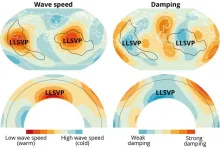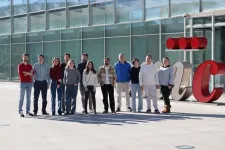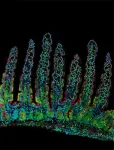(Press-News.org) Women are born with two X chromosomes and inherit one from each parent. But in every cell of their body, just one X chromosome is needed – so the other is randomly inactivated. Some cells use only a maternal X chromosome; others rely only on the paternal X.
Now, UC San Francisco researchers have found that when the brain cells of female mice express only a maternal X chromosome, their memory and cognitive skills deteriorate faster than female mice that express both maternal and paternal X chromosomes.
The discovery, which appears Jan. 22 in Nature, could explain the variation in brain aging between the sexes, since males inherit only a maternal X, as well as the variation between individual women.
“These findings raise the possibility that some women who express more of their mom’s X chromosome just by pure chance may have more cognitive impairment with aging or an increased risk for diseases like Alzheimer’s,” said Dena Dubal, MD, PhD, a professor of neurology and the David A. Coulter Endowed Chair in Aging and Neurodegenerative Disease at UCSF, and the senior author of the new paper. “Ultimately, it could also help us find constructive strategies for slowing brain aging in both sexes.”
X marks the brain
Previous research has hinted that the X chromosome – of which most women have two and most men have just one – is vital to brain health. Mutations in the X chromosome often cause intellectual disability, and women born with just one X chromosome (a diagnosis known as Turner Syndrome), can have cognitive impairments. X chromosomes, some researchers hypothesize, could help explain sex differences in cognition, verbal memory, or brain disease risk.
“Given the fact that the X chromosome is enriched for brain-related genes, it became very important for us to know what roles it might be playing in brain aging,” said Samira Abdulai-Saiku, PhD, a UCSF postdoctoral fellow and first author of the new work.
Dubal and Abdulai-Saiku were especially interested in whether the origin of the X chromosome – from mom or from dad – mattered to cells. They knew that when egg and sperm cells form, chemical tags are added to certain genes on the chromosomes. These marks differ depending on whether the chromosome is from the mother (egg) or father (sperm). The marks impact what genes are activated when each chromosome is used in cells.
In the new study, the research team bred female mice either to express only maternal X chromosomes, or a mixture of maternal and paternal X chromosomes.
“Skewing of the X chromosome is common among humans, and there are certainly women who are walking around with much higher or lower levels of maternal X chromosomes than others, just by chance,” said Dubal. “There has been little research on the potential consequences of this.”
The effect of maternal chromosomes
Female mice with only an active maternal X chromosome, Dubal and Abdulai-Saiku discovered, showed poorer memory and learning abilities as they aged. In the brains of these mice, the maternal X chromosome sped up biological aging in the hippocampus – a brain area crucial for learning and memory.
“What we showed is that these animals’ brains were really aging faster than the brains of their genetically identical sisters who had both mom’s and dad’s X chromosomes turned on,” explained Dubal.
Carrying out detailed analyses of the brain cells, the team was then able to identify certain genes that were completely silenced on maternal X chromosomes but not paternal ones.
When the researchers used CRISPR gene editing technology to activate the silenced genes on maternal X chromosomes in female mice, they became smarter in their old age.
“Together, all these experiments suggested to us that the parental origin of an X chromosome can have a big impact on brain health,” Abdulai-Saiku said.
Evolutionary roots?
The new study was not designed to test exactly why the maternal X chromosome would accelerate brain aging compared to the paternal X chromosome. However, Dubal hypothesized that the genes silenced on the maternal chromosome could convey an advantage earlier in life.
“It may be that this gene expression pattern is actually really beneficial to brain development, but then there is this tradeoff later in life,” she said.
Dubal hopes to continue studying the role of the X chromosome in brain aging, and whether it can explain people’s risk of brain diseases or memory loss.
“The X chromosome you inherited from your mom is turning off genes, accelerating aging, and impairing cognition,” she said. “Can we reverse this?”
Authors: The other authors of the paper were Shweta Gupta, Dan Wang, Francesca Marino, Arturo J. Moreno and Barbara Panning of UCSF and Yu Huang and Deepak Srivastava of UCSF and the Gladstone Institutes.
Funding: Primary funding for the study was by the Primary funding for the study was by the National Institute of Aging (RF1AG079176, RF1AG068325), American Federation for Aging Research, the Bakar Aging Research Institute, and the Simons Foundation (1018027, 811225SPI).
Disclosures: Dena Dubal serves on the Board of the Glenn Medical Foundation, consulted for Unity Biotechnology (unrelated to content of manuscript) and SV Health Investors (unrelated to the content of the manuscript), and serves as an Associate Editor at JAMA Neurology. All other authors declare no competing interests.
About UCSF: The University of California, San Francisco (UCSF) is exclusively focused on the health sciences and is dedicated to promoting health worldwide through advanced biomedical research, graduate-level education in the life sciences and health professions, and excellence in patient care. UCSF Health, which serves as UCSF's primary academic medical center, includes top-ranked specialty hospitals and other clinical programs, and has affiliations throughout the Bay Area. UCSF School of Medicine also has a regional campus in Fresno. Learn more at ucsf.edu, or see our Fact Sheet.
###
Follow UCSF
ucsf.edu | Facebook.com/ucsf | YouTube.com/ucsf
END
Could brain aging be mom’s fault? The X chromosome factor
UCSF researchers discovered that when brain cells rely only on the X chromosome a female has inherited from her mom – instead of from her dad – they age more quickly.
2025-01-22
ELSE PRESS RELEASES FROM THIS DATE:
Subterranean ‘islands’: strongholds in a potentially less turbulent world
2025-01-22
Deeply hidden in Earth’s mantle there are two huge ‘islands’ with the size of a continent. New research from Utrecht University shows that these regions are not only hotter than the surrounding graveyard of cold sunken tectonic plates, but also that they must be ancient: at least half a billion years old, perhaps even older. These observations contradict the idea of a well-mixed and fast flowing Earth’s mantle, a theory that is becoming more and more questioned. “There is less flow in Earth’s ...
Complete recombination map of the human-genome, a major step in genetics
2025-01-22
Complete recombination map of the human genome, a major step in genetics
Scientists at deCODE genetics/Amgen have constructed a complete map of how human DNA is mixed as it is passed down during reproduction. The map marks a major step in the understanding of genetic diversity and its impact on health and fertility. It continues 25 years of research at deCODE genetics into how new diversity is generated in the human genome, and its relationship to health and disease.
The new map, appearing today in the online edition of Nature, is the first to incorporate shorter-scale shuffling, ...
Fighting experience plays key role in brain chemical’s control of male aggression
2025-01-22
Like humans, mice will compete over territory and mates, and show increased confidence in their fighting skills the more they win. At first, a brain chemical called dopamine is essential for young males to master this behavior. But as they gain experience, the chemical grows less important in promoting aggression, a new study shows.
Dopamine has been linked to male aggression for decades. How past experiences might influence this relationship, however, had until now been unclear.
In experiments in rodents, a team led by researchers at NYU Langone Health boosted activity in dopamine-releasing cells in a part of the brain called the ventral tegmental area. The findings revealed that in ...
Trends in preventive aspirin use by atherosclerotic cardiovascular risk
2025-01-22
About The Study: Following landmark clinical trials and changes in guideline recommendations, self-reported primary prevention aspirin use decreased among older adults and adults with low atherosclerotic cardiovascular disease (ASCVD) risk for whom aspirin was not recommended, but also decreased among adults with higher ASCVD risk for whom aspirin may still be recommended. Despite these reductions, many patients with limited likelihood to benefit reported continuing to take aspirin.
Corresponding Author: To contact the ...
Sex differences in long COVID
2025-01-22
About The Study: This study found that female sex was associated with an increased risk of long COVID compared with male sex, and this association was age, pregnancy, and menopausal status dependent. These findings highlight the need to identify biological mechanisms contributing to sex specificity to facilitate risk stratification, targeted drug development, and improved management of long COVID.
Corresponding author: To contact the corresponding author, Dimpy P. Shah, M.D., Ph.D., email ShahDP@uthscsa.edu.
To ...
Medically recommended vs nonmedical cannabis use among US adults
2025-01-22
About The Study: The results of this study showed that adults ages 18 to 49 reporting medical-only or medical-nonmedical cannabis use vs nonmedical-only use had higher prevalence of cannabis use disorder at all severity levels and reported more frequent cannabis use. These findings suggest that medically recommended cannabis is not associated with reduced addiction risk compared with nonmedical use.
Corresponding author: To contact the corresponding author, Nora D. Volkow, M.D., email nvolkow@nida.nih.gov.
To access the embargoed study: ...
Spanish scientists discover how the gut modulates the development of inflammatory conditions
2025-01-22
A study led by David Sancho at the Centro Nacional de Investigaciones Cardiovasculares (CNIC) in Madrid reveals how an increase in intestinal permeability allows the natural gut bacteria to cross the intestinal barrier and reach the bone marrow, where they induce epigenetic changes—modifications that alter gene activity without affecting DNA sequence—in the stem cells that give rise to immune cells. The epigenetic changes induced by the translocated gut bacteria generate “trained” immune cells primed to respond more efficiently to future infections. However, this same ability to amplify the immune response can also aggravate the inflammatory conditions such as ...
Compact comb lights the way for next-gen photonics
2025-01-22
In the world of modern optics, frequency combs are invaluable tools. These devices act as rulers for measuring light, enabling breakthroughs in telecommunications, environmental monitoring, and even astrophysics. But building compact and efficient frequency combs has been a challenge—until now.
Electro-optic frequency combs, introduced in 1993, showed promise in generating optical combs through cascaded phase modulation but progress slowed down because of their high power demands and limited bandwidth. This led to the field being dominated by femtosecond lasers and Kerr soliton microcombs, which, while effective, require complex tuning and ...
New research reveals how location influences how our immune system fights disease
2025-01-22
Seattle, WASH.—January 22, 2025—The human immune system is like an army of specialized soldiers (immune cells) each with a unique role to play in fighting disease. In a new study published in Nature, led by scientists at the Allen Institute, La Jolla Institute for Immunology, and UC San Diego, researchers reveal how cells known as tissue-resident memory CD8 T cells, play unique and specialized roles based on where they are located within the small intestine. Tissue-resident memory cells provide a local first ...
AI in cell research: Moscot reveals cell dynamics in unprecedented detail
2025-01-22
Thanks to a new technology called Moscot (“Multi-Omics Single-Cell Optimal Transport”), researchers can now observe millions of cells simultaneously as they develop into a new organ—for example, a pancreas. This groundbreaking method was developed by an international research team led by Helmholtz Munich and has been published in the renowned journal Nature.
Until now, biologists had only a limited understanding of how cells develop in their natural environment—for instance, when they form an organ in the ...
LAST 30 PRESS RELEASES:
Smithsonian planetary scientists discover recent tectonic activity on the Moon
Government censorship of Chinese chatbots
Incorporating a robotic leg into one’s body image
Brain imaging reveals how wildlife photos open donor wallets
Wiley to expand Advanced Portfolio
Invisible battery parts finally seen with pioneering technique
Tropical forests generate rainfall worth billions, study finds
A yeast enzyme helps human cells overcome mitochondrial defects
Bacteria frozen in ancient underground ice cave found to be resistant against 10 modern antibiotics
Rhododendron-derived drugs now made by bacteria
Admissions for child maltreatment decreased during first phase of COVID-19 pandemic, but ICU admissions increased later
Power in motion: transforming energy harvesting with gyroscopes
Ketamine high NOT related to treatment success for people with alcohol problems, study finds
1 in 6 Medicare beneficiaries depend on telehealth for key medical care
Maps can encourage home radon testing in the right settings
Exploring the link between hearing loss and cognitive decline
Machine learning tool can predict serious transplant complications months earlier
Prevalence of over-the-counter and prescription medication use in the US
US child mental health care need, unmet needs, and difficulty accessing services
Incidental rotator cuff abnormalities on magnetic resonance imaging
Sensing local fibers in pancreatic tumors, cancer cells ‘choose’ to either grow or tolerate treatment
Barriers to mental health care leave many children behind, new data cautions
Cancer and inflammation: immunologic interplay, translational advances, and clinical strategies
Bioactive polyphenolic compounds and in vitro anti-degenerative property-based pharmacological propensities of some promising germplasms of Amaranthus hypochondriacus L.
AI-powered companionship: PolyU interfaculty scholar harnesses music and empathetic speech in robots to combat loneliness
Antarctica sits above Earth’s strongest “gravity hole.” Now we know how it got that way
Haircare products made with botanicals protects strands, adds shine
Enhanced pulmonary nodule detection and classification using artificial intelligence on LIDC-IDRI data
Using NBA, study finds that pay differences among top performers can erode cooperation
Korea University, Stanford University, and IESGA launch Water Sustainability Index to combat ESG greenwashing
[Press-News.org] Could brain aging be mom’s fault? The X chromosome factorUCSF researchers discovered that when brain cells rely only on the X chromosome a female has inherited from her mom – instead of from her dad – they age more quickly.




